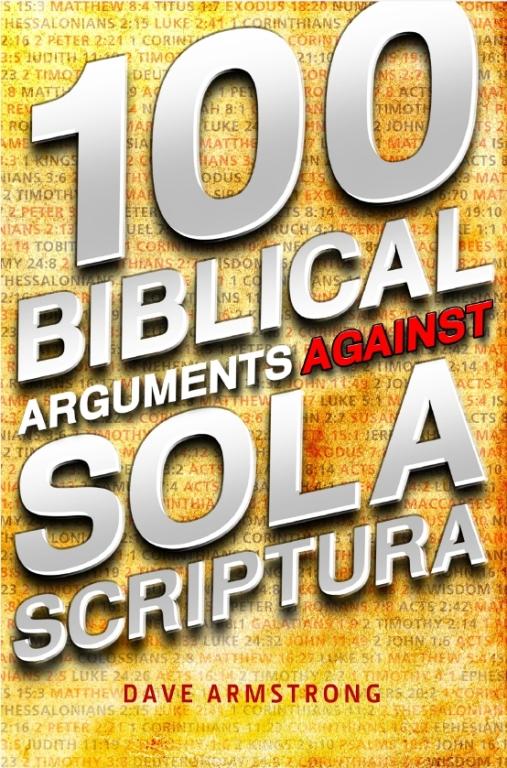
[Book and purchase information]
***
(5-7-13; expanded on 12-1-17)
***
[This analysis was part of my discontinued book, 501 Biblical Arguments Against Sola Scriptura and didn’t make it into the revised, much more compact 100 Biblical Arguments Against Sola Scriptura (Catholic Answers, 2012). I had also dealt with it in A Biblical Defense of Catholicism (Sophia Institute Press, 2003), pp. 16-18: which I will cite below. ]
***
RSV: I have applied all this to myself and Apol’los for your benefit, brethren, that you may learn by us not to go beyond what is written, that none of you may be puffed up in favor of one against another.
The whole passage is an ethical exhortation to avoid pride, arrogance and favoritism, and as such, has nothing to do with the idea of the Bible and the written word as some sort of all-encompassing standard of authority over against the Church. St. Paul’s teaching elsewhere precludes such an interpretation anyway. One of the foundational tenets of Protestant hermeneutics is to interpret less clear, obscure portions of Scripture by means of more clear, related passages.
St. Paul is telling the Corinthians to observe the broad ethical precepts of the Old Testament (some translators render the above clause as “keep within the rules”), as indicated by his habitual phrase, “it is written,” which is always used to precede Old Testament citations throughout his letters.
Assuming that he is referring to the Old Testament (the most straightforward interpretation), this would again prove too much, for he would not be including the entire New Testament, whose canon was not even finally determined until 397 A. D. To summarize, then, 1 Corinthians 4:6 (that is, one part of the verse) fails as a proof text for sola Scriptura for at least three reasons:
A ) The context is clearly one of ethics. We cannot transgress (go beyond) the precepts of Scripture concerning relationships. This doesn’t forbid the discussion of ethics outside of Scripture (which itself cannot possibly treat every conceivable ethical dispute and dilemma);
B ) The phrase does not even necessarily have to refer to Scripture, although this appears to be the majority opinion of scholars (with which I agree);
C ) If what is written refers to Scripture, it certainly points to the Old Testament alone (obviously not the Protestant “rule of faith”). Thus, this verse proves too much and too little simultaneously.
In A Biblical Defense of Catholicism (p. 17), I wrote:
The clause emphasized above, which is used as a proof for sola Scriptura, is thought to be difficult in the Greek, so much so that one Protestant translator, James Moffatt, considered it beyond recovery and refused to translate it! Yet the meaning seems fairly clear when the whole context is taken into consideration (at the very least verses 3-6). This basic principle of biblical interpretation (context) is often neglected, even by good scholars, presumably due to presuppositional bias. For example, the great Evangelical theologian G. C. Berkouwer, who writes many insightful and edifying things about Scripture, falls prey to this tendency repeatedly, in using this portion of a verse to imply the notion of sola Scriptura, in his magnum opus on Scripture.
One simply has to read the phrase following the “proof text” to see what it is to which St. Paul is referring. . . .
Scott Hahn, in his Ignatius Catholic Study Bible, comments as follows:
Paul cautions believers to stay within the limits of personal humility defined by the Scriptures. He is referring specifically to the string of OT warnings about boasting quoted earlier in the letter (1:19, 31; 3:19-20). Paul’s purpose here is to halt the damaging effects of arrogance in Corinth, as indicated by the clarification that follows. Interpretations of this verse that suggest Paul is restricting the basis for Christians doctrine and morals to what is explicitly set forth in the books of the Bible (sola Scriptura) are misleading and untenable. Nothing in the context points to such a broad concern, and in any case Paul insists elsewhere that even the inspired preaching of the apostles is on a par with the written word of God (1 Thess 2:13; 2 Thess 2:15; 3:6).
***













